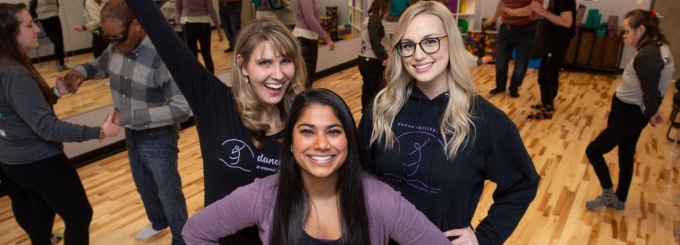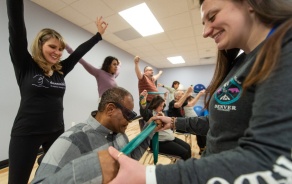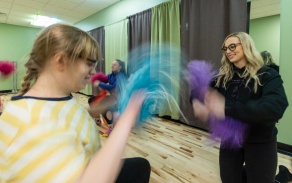Danceability

Robin Bishop, MSW '06, Elissa Webster, MSW '12 and Morgan Bauer, BA/MSW '19 stand in the Danceability studio.
A dancing social worker, an inclusive dance studio
Danceability, creating community and confidence
By Jana Eisenberg
It’s not much of a stretch to observe how deeply Robin Bishop, MSW ’06, integrates her social work training and instincts into the dance studio that she co-founded in 2007. The studio, a nonprofit, is called Danceability, and it specializes in programs— including classes, instruction, performances and community-building— for children and adults with special needs and their parents or caregivers.
Bishop’s lifelong involvement with dance, combined with her abiding interest in volunteerism, drove her career to where she is today: running a nonprofit that fills a clearly identified need and has grown continually, increasing the size of its facility, staff and programs since its founding 12 years ago.
Like many an MSW, this was not her intended path, though she’d been a dancer and dance instructor throughout most of her life. Earlier in her career, during stints at Catholic Charities, Renaissance Campus and Hospice, she said, “people kept honing in on my dance background. It was somehow incorporated into everything I did.”
Combined with her training, interest and experience, her education provides a deep well from which she can draw for her work. Bishop holds dual undergraduate degrees in dance/health and human services and her MSW. She has also completed dance therapy coursework.
The business started after Bishop identified the demand. “I’d started hearing about people wanting a dance studio for kids with special needs that also had a family focus,” she said. “Being a dancer, dance teacher and social worker, I knew I could offer that— both the dance and figuring out how to improve dancers' lives as a whole.”
After she identified the basic need, the fact that she and her business partner had no experience running a business didn’t stop them from accepting what seemed to be the inevitable. As they started thinking about it and talking to people, “doors kept opening.”
With all the positive responses, they ended up on hyper-speed: in the space of six months, they got a business mentor through SCORE Buffalo, wrote a business plan, formed a board of directors, found a space and through a pre-Kickstarter grassroots fundraiser asking friends and family for $5 per donation, raised exactly enough money to secure the location.
Signing up their first group of dancers in 2007, Danceability is more than answering the call that Bishop heard 12 years ago.
How are they able to accommodate the various levels of needs and abilities? Bishop says it’s no secret, and takes a page from the social work playbook to create the accepting, respectful and inclusive environment that Danceability has for the dancers (girls and boys, women and men), parents and caregivers whom it serves.
First, comes assessment. “We focus on the individual— learn their likes, dislikes and abilities,” she said. “We analyze who each person is, and think about which other students they might mesh with. Then we use that information to add them to an existing class or create a class for them. We set goals for each dancer each year, and then see what they meet. Every year, each dancer is reassessed, considering what might have changed with their schooling, health, medications, home life, etc.”
The dance sessions have elements of traditional dance classes; they also can have farther-reaching effects. “While students are here, they’re also learning things like social skills, appropriate boundaries and posture—all that translates into life. It can help improve behaviors and build confidence,” she said.
Like a typical dance studio, there is tuition, though through individual and corporate donations and sponsorships, Danceability funds 20% of their dancers with scholarships. The business is not funded by any state or federal grant money, operating on a low budget and occasionally hosting fundraisers to keep things going.
Danceability is able to provide one-on-one work because of their volunteer system. “Each class has a teacher, who is leading the class. Then each dancer has a volunteer with them during class. The volunteers can be cheerleaders, seeing that the dancers are working hard, getting a step for example. They give and get hugs and smiles.” (See sidebar for a story on one of the volunteers, Morgan Bauer, BA/MSW ‘19.)
Family support and community-building are huge parts of the process, affirms Bishop. “We had a newer dancer, a girl under 10 years old—she started exhibiting negative behaviors,” said Bishop. “Her mom was apologizing for the behavior— I thought that the mom could use more support. I asked another ‘veteran’ dance mom to connect with the newer mom and see if she could help. This holistic approach makes it successful and unique.”
“We like to have the parents in the waiting room, not in the class,” continued Bishop. “Sometimes, with a newer dancer, the mom will want to go in. One time, this mom was amazed at what her daughter was doing. We can sometimes flip the idea that their kids are fragile— most of the time you just have to find what makes them click. I love seeing tiny kids grow to teenagers and adults. I don’t see special needs people; I see dancers.”
An introduction to social work through Danceability
While never involved in dancing, BA/MSW student Morgan Bauer grew up very familiar with those with special needs: her mom was a special education teacher, and Bauer was drawn to working with the population as well. By the time she was in middle school, she was coaching special needs athletes for the Special Olympics.
Once she was a college freshman, she found herself missing the work with that community, as well as slightly adrift; “having a hard time adjusting, as freshmen do,” said Bauer. It was then that she met Robin Bishop, MSW ‘06, founder of Danceability (see main story page 6).
“I was looking for a volunteer opportunity, so I sat in on one of her dance classes to see if it would be a good match,” said Bauer. “I fell in love. The students are amazing. And everyone else at Danceability— the teachers, volunteers, families and the group home staff who bring the older dancers— is very involved. The whole Danceability community celebrates people with special needs— and all their abilities.”
The connection was so strong that she’s entirely switched gears in her education— she’d started out in occupational therapy, and after volunteering at Danceability and talking with Bishop and some of the other teachers, including Elissa Webster, MSW ‘12, Bauer has changed her major to social work.
She feels the switch comes at the right time. “Our world is trying to get better about being inclusive, but special needs people aren‘t included as much,” she said. “So, having a specific dance team for them is so beneficial. It’s a place where they learn that they can be themselves.”
Bauer affirms that social work training provides valuable perspective. “I’ve learned to go into things with an open mind, and to focus on [an] individual’s strength,” she noted. “It’s like when you see any new client, you try to help them to focus on their strengths as well.
“There can be challenges. With this population, we use a lot of redirection,” she added. “During the beginning of class, while everyone is stretching, we talk about what’s going on in the students’ lives. They show what their needs are that day— they may say it, or with non-verbal dancers, we may be able to tell from facial expressions and body language what they may be struggling with. There is a constant conversation between teachers, students and volunteers in the class. It’s cool to see how the dancers interact with and help each other. We all stay positive.”
As far as being a volunteer in a dance class with no dance background, Bauer adds that she needs assistance once in a while. “I’m kind of clumsy and not a very good dancer,” she said. “The students are so good, sometimes they even help me with the step!”

Robin Bishop and volunteers work with a blind student.

Morgan Bauer helps a student learn about dancing.